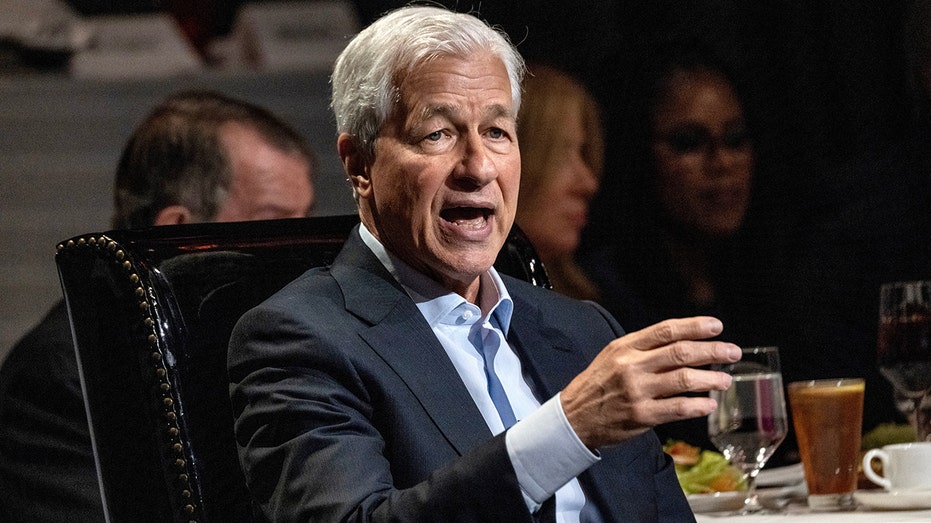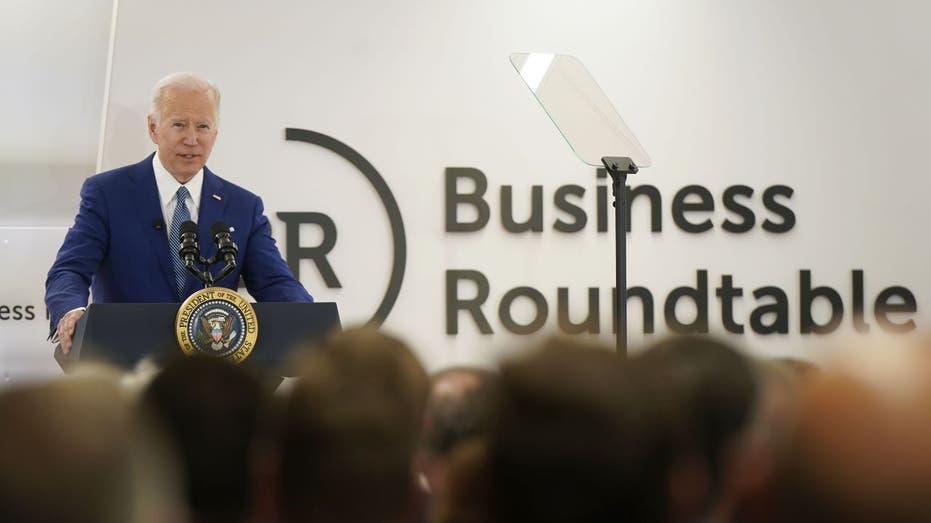State treasurers to Business Roundtable: focus on shareholders not woke activism
The Business Roundtable redefined the purpose of a corporation in 2019 to include a broader focus on stakeholders over shareholders
Wokeness became a ‘cultural phenomenon’ after George Floyd’s death: Charles Gasparino
FOX Business contributor Charles Gasparino joins ‘Varney & Co.’ to discuss his new book, ‘Go Woke, Go Broke.’
A group of more than a dozen state treasurers sent a letter to the Business Roundtable on Wednesday urging the group of leading corporate executives to restore their definition of a corporation's purpose to focusing on shareholders, rather than a broader definition they argue opens the door to woke activism.
The group of 14 state treasurers said in a letter to the Business Roundtable obtained by FOX Business that its 2019 move to redefine the purpose of a corporation beyond providing value for shareholders into a broader focus on stakeholders including customers, employees, suppliers, communities with shareholders listed last was misguided.
"After five years of abject failure, the Business Roundtable's attempted redefinition of the purpose of a corporation (the 'Redefinition') should be discarded into the 'ash heap of history,'" they wrote. "As treasurers of our respective states, who are responsible for many state and retirement investments, we urge you to abandon the fatally flawed Redefinition to return to the purpose of maximizing value to the owners, your shareholders."
They explained that Business Roundtable had affirmed the shareholder-centric view for more than 20 years before the redefinition, which it said represented "corporate arrogance or convenience" when the group's CEOs went ahead with the "radical departure from prior statements."
LOWE'S DROPS SOME DEI POLICIES, LATEST AMERICAN COMPANY TO DO SO: MEMO

The Business Roundtable redefined the purpose of a corporation in 2019, shifting from a focus solely on shareholder value to a broader emphasis on various stakeholder groups. (Photographer: Michael Nagle/Bloomberg via Getty Images / Getty Images)
At the time of the change, the Business Roundtable said its change outlined a "modern standard for corporate responsibility." The redefinition, which was endorsed by 181 CEOs in 2019, signaled that while companies each serve their own corporate purpose "we share a fundamental commitment to all of our stakeholders" and seek to deliver value to all of them "for the future success of our companies, our communities and our country."
"The American dream is alive, but fraying," said Jamie Dimon, CEO of JPMorgan Chase who chaired the Business Roundtable in 2019. "Major employers are investing in their workers and communities because they know it is the only way to be successful over the long term. These modernized principles reflect the business community's unwavering commitment to continue to push for an economy that serves all Americans."
JOHN DEERE RELEASES STATEMENT REJECTING DEI POLICIES: 'COMMITTED TO OUR CUSTOMERS'
A Medium post published this month by the Business Roundtable marking five years since the redefinition said the change reflected members' convictions that, "In the long term, the interests of a company's stakeholders are inseparable. No single stakeholder will succeed unless they all do."
"It was not a call on companies to address every societal challenge, but rather to focus on those who contribute directly to a company's success. It was the view of Roundtable CEOs that this would make companies more successful in the long run, while advancing broader economic opportunity," the Business Roundtable wrote.

Jamie Dimon is the chairman and chief executive officer of JPMorgan Chase and chaired the Business Roundtable at the time of the redefinition. (Photographer: Victor J. Blue/Bloomberg via Getty Images / Getty Images)
The treasurers noted that when the change was made, 54% of Republicans and 36% of Independents "felt that large corporations had a positive effect on the country," but that by 2021 less than a third of all groups, including Republicans, Democrats and Independents believed that to be the case.
"CEOs' decision to wade into societal issues has led to widespread distrust that has undoubtedly created a negative political environment for corporations that will drag down shareholder value over the long term (ironically, this term is used to push political agendas in the short-term and so has become a politically charged term itself)," the wrote.
The group of treasurers explained that they don't believe that CEOs and corporations have the capacity to "deliver value for all" and "improve society" and that by attempting to do so, businesses end up picking winners and losers among stakeholder groups.
RED STATE SUES TECH GIANT IBM OVER DIVERSITY 'QUOTAS'

State treasurers criticizing the Business Roundtable's redefinition argue it has opened the door to corporations being more political about societal issues. (Photographer: Leigh Vogel/Bloomberg via Getty Images / Getty Images)
They said that the Business Roundtable's redefinition has served as a tacit endorsement of environmental, social and governance (ESG) and diversity, equity and inclusion (DEI) policies to be a focus of corporations – which has resulted in hiring to meet DEI metrics and the adoption of racial quotas, rather than focusing on hiring based on merit.
"A refocus on shareholders would better serve stakeholder employees by hiring and retaining the best candidates, regardless of race. And legal battles would likely disappear," the treasurers explained.
"Institutions of all kinds are being pressured to depart from their proper purpose and serve a left-wing ideology. In the case of corporations, doing so harms shareholder value. It is more important than ever to honestly state the purpose of your corporation and your role, and 'live not by lies,'" they wrote, adding that while pressure from activists is real, companies should stand up to their efforts to bully corporate America into compliance.
GET FOX BUSINESS ON THE GO BY CLICKING HERE
"An important step you can take is to withdraw your company's signature from the Redefinition. The next step is for the Business Roundtable to issue an updated document that accurately reflects the purpose of a corporation and remind people about the incredible benefits business provides society, without becoming political promoters or enforcers," the treasurers concluded.
State treasurers who signed onto the letter include Alabama's Andrew Sorrell, Alaska's Adam Crum, Arizona's Kimberly Yee, Idaho's Julie Ellsworth, Louisiana's John Fleming, Mississippi's David McRae, Nebraska's Mike Foley, North Carolina's Dale Folwell, North Dakota's Thomas Beadle, Oklahoma's Todd Russ, South Carolina's Curtis Loftis, South Dakota's Josh Haeder, Utah's Marlo Oaks, and Wyoming's Curt Meier.




















